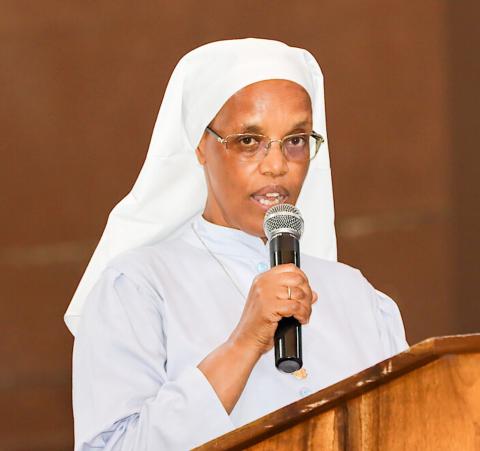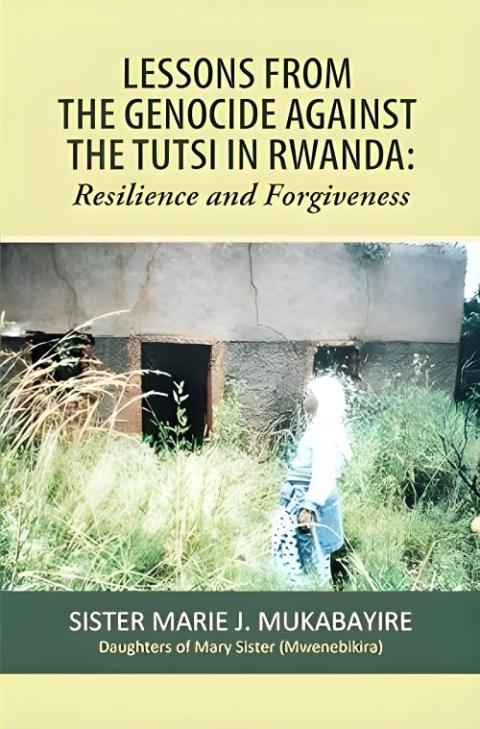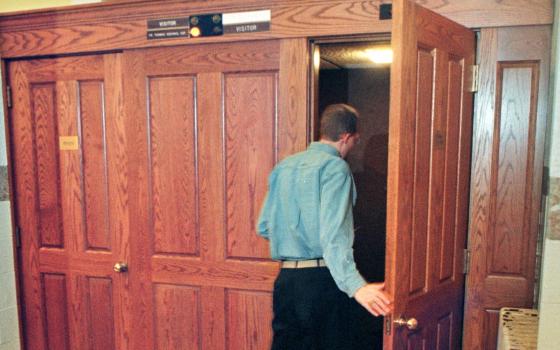Participants hold a candlelight vigil at the BK arena in Kigali, Rwanda, April 7, 2024, during a commemoration event, known as "Kwibuka" (Remembering) as the country marks the 30th anniversary of the 1994 genocide. OSV News/Reuters/Jean Bizimana)
Benebikira Sr. Marie Josepha Mukabayire escaped to the nearby convent of the Sisters of St. Mary of Namur, a few miles from her home village in Southern Rwanda, a few days before the genocide against the Tutsi began in the summer of 1994.
In the first chaotic days, thousands of people, including Mukabayire's parents and her five siblings, sought shelter in the neighboring Nyumba Catholic Parish, located in the former Gishamvu Commune, now the Huye District in Southern Rwanda, hoping for protection from the local administrative authorities. However, everyone was killed in the following days.
"I chose to heal, to move on, and to create my new space of peace, my future, to continue the work that Jesus assigned for me," Mukabayire told Global Sisters Report. She shared a lifetime of memories and an uplifting message from her book Lessons from the Genocide Against the Tutsi in Rwanda: Resilience and Forgiveness.
Why did you write this book?
The idea of publishing the book came from the courage and determination I learned [from] my parents. They never gave up despite the massacres that claimed many of our family members. My father went through a lot of pain because he was jailed many times after they accused him of being an accomplice of the Rwanda Patriotic Front. Despite the hard situation [he] endured, he did not fail in his parental responsibilities. He did not want us to become victims of the problems he went through.

Benebikira Sr. Marie Josepha Mukabayire, a survivor of the 1994 Rwandan genocide against the Tutsi, wrote a memoir about her experience. (Marie Josepha Mukabayire)
My mother also lived in Rwanda with two brothers, her parents and other children and fled in 1960 to become refugees in neighboring countries. However, she was not discouraged by having no place to call home. Our parents' suffering did not mar our childhood. Instead, they taught us to love one another deeply.
My parents have been the foundation for overcoming my sorrow and moving forward with my life. They also helped me recognize the signs of God's call and respond with obedience. I am sure God has great plans to give me hope and a future. This book will help many who want to leave a legacy of peace for the young generation and avoid further suffering.
Legacy is important and something everyone should strive to leave behind. This book aims to help young people live in harmony and ensure that genocide will never happen again. This book conveys a message of hope, resilience and courage so that the young generation will not refrain from sharing what happened before and during the 1994 genocide because forgiveness is only possible when the truth is told. The purpose of this book is to increase awareness of Rwandan history about what really happened and help build the country on a foundation of truth.
The genocide against the Tutsi in Rwanda did not happen overnight; it was a long-prepared atrocity. There is a need to nurture resilience in children who lost their parents, the widows who needed attention and love, and everyone else in need as a consequence of the genocide against the Tutsi.

"Lessons from the Genocide Against the Tutsi in Rwanda: Resilience and Forgiveness" by Benebikira Sr. Marie Josepha Mukabayire (Marie Josepha Mukabayire)
Tell us more about your book.
This book tells the story of the many children I helped regain the joy of living. Most of them are now married with families. Many were children during the genocide. This book teaches them how to overcome the sadness, sorrow and anguish they endured because they lost their parents and close relatives.
However, there are challenges, as the "genocide ideology" is still prevalent among a few young people whose parents were genocide perpetrators. These young people need to be educated to ensure they do not take part in any form of genocide ideology.
This book aims to share my experience during 100 days of horror. The key message is that God can use you when you have faith in him. Telling my story to these young people will help them build resilience with determination and courage. Combating genocide ideology is an ongoing journey, as those who harbor these beliefs continually expose themselves, and the youth have a critical role to play.
God saved many of us because the Almighty wanted us to accomplish this mission of telling the truth. Many of our friends and relatives were hacked to death, but for us survivors, we have a story to tell and express our gratitude to the people who risked their lives to help others during the genocide.
What else would you like to share?
Telling my experience before and during the genocide against the Tutsi required courage and determination because sometimes writing hurts the scars that are still healing.
When life feels overwhelming, turning to prayer for courage and strength can help us find peace and resilience. It is also important to look at meaningful Bible verses reminding us of the importance of loving others. Prayer has a remarkable ability to encourage hope in our minds and equip us with emotional resilience.
Genocide denial is still a concern in Rwanda, as it provides an avenue to continue genocide and prevent survivors and victims from finding paths forward. It is important to understand that this ideology will never erase the truth because the genocide was perpetrated in broad daylight. I am trying to help people know what happened because everyone has a story to tell.
Advertisement
Was writing this book connected to your journey as a religious?
Combining my call to religious life with publishing a book on genocide has been about mixing business with pleasure. The genocide did not target only ordinary people. Members of religious communities were also killed. The suffering affected both.
For example, Catholic priest Joseph Niyomugabo is one of the few members of the clergy who knew that his life was in danger, but he refused to leave hundreds of people in the hands of killers.
God's plans are always for our good. He saved us at no cost, not because he was against the killers, but to show them that no one can destroy a race as they please. My story is similar to that of Moses, whose mother hid him in a basket among the reeds by the river, symbolizing her act of faith and protection amid danger and uncertainty. It was a miracle for me to survive the killings.




